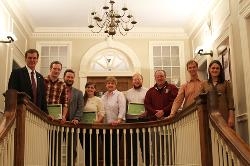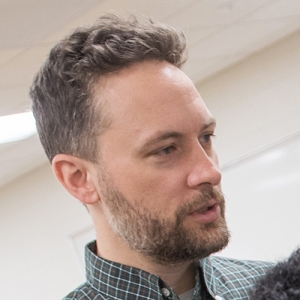Reminders to turn computers off at night, high-speed bicycles and timers in residence hall showers are among the projects selected as winners of annual Presidential Green Grants Monday.
“If Eliphalet Nott were alive today, he would be totally behind this initiative,” President Stephen C. Ainlay said in honoring this year’s eight projects. They will share nearly $13,000 in grants, which support environmentally sustainable projects at Union. “He was an innovator, and what you are all doing carries that message along.”
Now in its fifth year, the grants are administered by the College’s U Sustain Committee, made up of about 50 environmentally and socially concerned students, faculty and staff who steward the College’s sustainability initiatives.
To date, more than $60,000 in grants has been awarded, ranging from $200 to $2,000. Past projects include a new paper-free bulletin board in Reamer, the launch of Campus Kitchens and an energy audit of Golub House and Fox Hall.
"Union continues to be a leader in college sustainability," said Jeffrey Corbin, professor of biology and faculty co-chair of U Sustain. "And our success has truly been a team effort. All you have to do is look at the many creative and innovative ideas we are celebrating today."
The 2012-13 Green Grant winners:
Livia Carroll, administrative assistant, Modern Languages
Project: “Improvements, Upgrades, and Promotion for the Octopus’ Garden Organic Gardening Project”
Rationale: Now completing its fifth year as a participant in the College’s sustainability program, its third year with a harvest in excess of 1,000 pounds, and its second year with student club status, the Octopus’s Garden organic gardening project continues to look for ways to improve both its output and its visibility on campus. Maintaining essential elements of garden upkeep such as watering systems and pest prevention are ways of maintaining crop yields, while instituting new practices like soil testing or targeting marketing can contribute to greater successes. The student, staff, and faculty volunteers of Octopus’s Garden have both the experience behind them and the commitment to sustainability to use these additional resources effectively.
Kevin Skeuse '13
Project: “The American Society of Mechanical Engineers’ Human Powered Vehicle Competition”
Rationale: The American Society of Mechanical Engineers’ (ASME) annual Human Powered Vehicle Competition (HPVC) is a competition in which students from across the country design and build a vehicle that runs solely on the power provided by the rider. The competition not only allows students in different regions of the country to compete in a design competition, but also creates a chance for a large group of people to all work on creating a more environmentally friendly means of travel. Standard upright bicycles are great machines; however they lack the ability to travel at higher speeds, which makes long distance travel a lengthy and tiring endeavor.
The goal for this year’s team is to expand upon the knowledge of the teams from the previous two years and build an extremely efficient and extremely competitive human powered vehicle. As this is the third year that this vehicle is being designed, there is a wealth of knowledge that can be gained from previous efforts regarding the design of both the frame of the vehicle and the fairing surrounding the vehicle.
David Glasser, enrollment systems analyst, Admissions
Project: "Promoting Energy Savings on Faculty, Staff and Lab Computers"
Rationale: Energy Star estimates that leaving desktop computers on overnight uses an additional $40 worth of energy each year. By encouraging staff to shut off their computers at night we can realize significant energy savings, which is good for both the environment and the bottom line.
We plan on developing stickers that can be attached to workstations/monitors to remind users to turn off their computer at the end of each day. This would be distributed at the beginning of the Do It in the Dark campaign.
John Rieffel, assistant professor, Computer Science
Project: "Fostering Union Bicycle Commuting: Bicycle Commuting Incentive Program"
Rationale: Among the many ways to improve Union College’s sustainability is to increase the number of college employees who commute to work via bicycle. Over the past three years, thanks largely to the generosity of Presidential Green Grants, Union has already made significant positive progress in this regard. In 2010 we were able to renovate the bicycle commuter locker rooms in the basement of Science and Engineering- converting them from dark and dank facilities into bright and welcoming spaces. In 2011 we were able to further improve the spaces with better lighting and shower curtains. In collaboration with USustain we also hosted a well-attended breakfast reception for Union’s cycle commuters this past bike-to-work week. An informal assessment of the improvements made of the past two years indicates that a growing number of campus commuters are happily using the new facilities.
This year we would like to move our attention to another aspect of the cycling infrastructure on Union’s campus: the bicycle racks. While the distribution of bicycle racks on campus is adequate, the “grid” style of bike racks are in fact incredibly poorly designed, and are not at all conducive to securely storing more than two bicycles across their six foot width. Once the two “good” spots on any rack are taken, campus cyclists often resort to locking their bikes to nearby handrails and lampposts.
We would like to use this year’s green grant award to replace the current bike racks with a more practical and more aesthetically appealing “hoop” style of rack. Our ambition is to have the funds from the Green Grant program matched by an additional $1,000 through the CDTA bike rack grant program. Facilities has generously offered to provide fee installation of any new racks.
Tom Heisinger, manager of grounds, Facilities
Project: "Pest Control using Beneficial Insects"
Rationale: The Union College Grounds Department has for many years utilized the principles of Integrated Pest Management (IPM) to make decisions regarding the college’s landscape. Integrated Pest Management, using the U.S.E.P.A. definition is an effective and environmentally sensitive approach to pest management that relies on a combination of common-sense practices. IPM programs use current, comprehensive information on the life cycles of pests and their interaction with the environment. This information, in combination with available pest control methods, is used to manage pest damage by the most economical means, and with the least possible hazard to people, property, and the environment. Integrated Pest Management takes advantage of all appropriate pest management options including, but not limited to, the judicious use of pesticides.
For 15 years or better the College Grounds Department has released beneficial insects as part of its IPM program to control many of the pest problems that occur on the campus landscape. This has had very positive impact and very little insecticide is used to control pests at Union as a result. Before introducing Beneficial Insects to the landscape many different types of insecticides were used to control these pests. I want to continue this program and expand upon it, however tight budgets don’t allow for any type of expansion. Typically the Department spends $500 to $1,200 annually on beneficial insects. I intend to continue to budget for this type of pest control, and this grant would expand on a very successful program and would allow for more of the campus to utilize this type of pest control method. I have been very pleased with the control of harmful pests that these beneficial insects have provided Union. There are just too many positives about the program not to continue with it and try to find anyway or means to expand upon it.
Mary Cornelia Pinkston '15
Project: "Reduction in Water Consumption via Shower Timers in Dorm Showers"
Rationale: Being that the students spend 90 percent of their time here in college in the residence halls, we focus a lot on how students in the halls can be more sustainable. They are asked to recycle their containers, turn off their lights and shut down computers when they are not in use. Yet one area that is rarely tackled or given attention is the amount of water used in the showers or when washing hands or brushing teeth. In our country we take water for granted and use more than is needed.
One way we can give attention to water use in the residence halls is to place timers into the shower stalls so students can keep track of the amount of time they are in the shower. We will do advertising in each of the halls through fliers and through word of mouth with the Resident Advisors. The Residential Life Sustainability Committee can make bulletin boards with information about the statistics of water use and how those numbers change as there is a reduction in overall time of shower and sink use. Residential Life can work with Facilities to possibly monitor water use in each of the halls with the timers to see if there is an overall reduction.
Project: “Individual Recycle Bins for Students Living in College Park”
Rationale: The need for individual recycle bins in apparent in residents’ rooms as most do not take the time to properly sort the recyclables and garbage that they create in their rooms. Purchasing small, individual recycle bins in all the rooms would encourage students to remain conscious about the waste they generate even in the privacy of their own room. It will also reduce the amount of unrecycled waste disposed of in College Park Hall.
This project will make a lasting impact on Union carbon footprint as these bins will promote proper recycling for many years following the installment of the grant. To secure the continual presents of the bins in the dorm, I plan for the bins to be added to the Room Condition Reports for the hall so that students are charged for the bins removal from the room and more bins can be purchased to replace those taken. Given that these bins cost slightly more than $5 – they might be charged $10 for their removal.
Ralph Cueva '13
Project: "Instrumentation And Thermodynamic Analysis of a Gas-Turbine Engine for Advancing NOX Reduction"
Rationale: The purpose of this project is to give Union College students an educational tool for better understanding how a jet engine works and how it impacts our environment. I plan to configure and instrument a small gas turbine engine based on the Brayton cycle. This turbine will serve as a demo lab to demonstrate the Brayton cycle. Students will be able to measure the engine’s work output, efficiency and Mono-nitrogen oxides (NOx) emissions. This project is geared toward being added to the curriculum of the Union College Mechanical Engineering Thermodynamics II course (MER 232). However, any student or faculty interested in research around increasing jet engine efficiency and NOx reduction can use this apparatus
Union is ranked among the country’s most environmentally responsible colleges, according to The Princeton Review’s “Guide to Green Colleges.” The free guide, produced in partnership with the U.S. Green Building Council, includes schools that have “demonstrated an above average commitment to sustainability in terms of campus infrastructure, activities and initiatives.”

